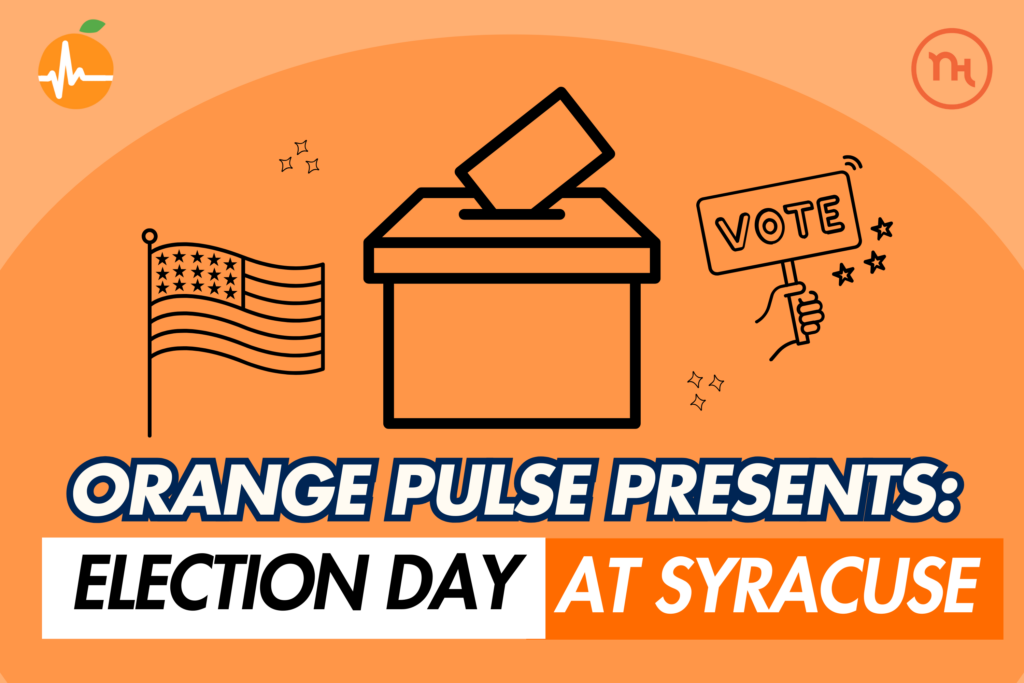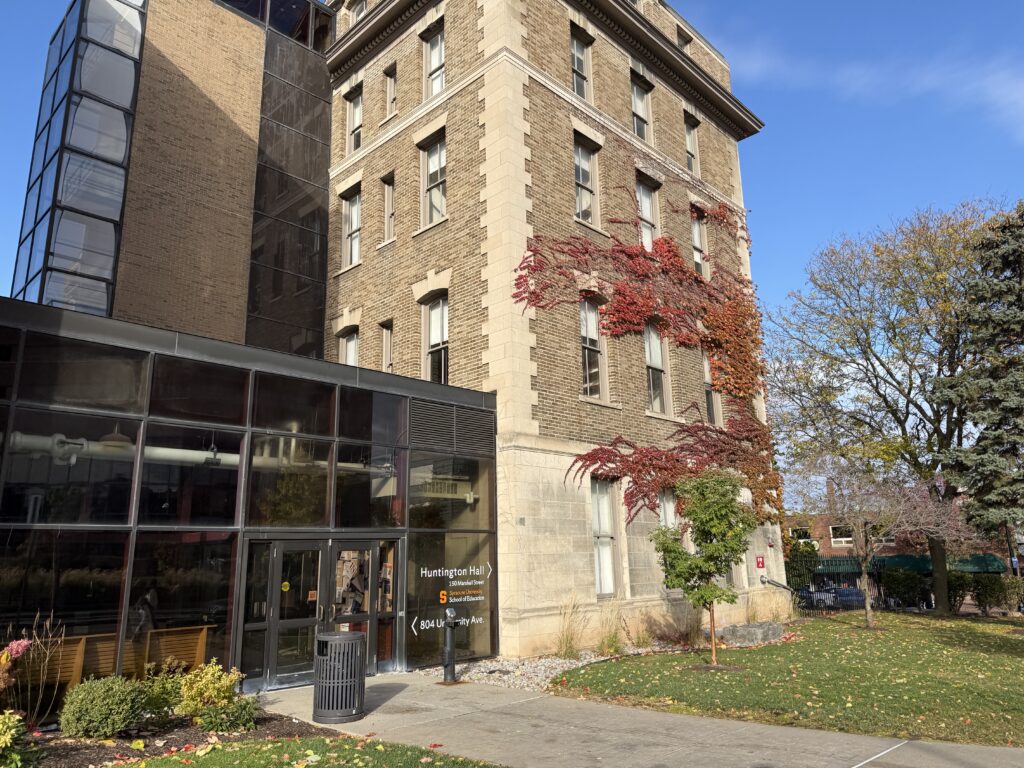Syracuse students weigh in on voting as off-year Election Day arrives
SU students weigh in on voting this Election Day
With mayoral races on the ballot and absentee voting as the only option for many, SU students share what drives them to cast their votes this year.

Election Day is here and students on college campuses are exercising their constitutional rights.
2025 is an off-year election, meaning it’s an odd-numbered year where neither a presidential nor a midterm election is taking place. Off-year elections rarely have state legislative elections or governor’s races, but have quite a few mayoral races – as is currently happening in Syracuse.
An Orange Pulse survey in late October sought to figure out how closely students on SU’s campus follow politics and how they think about voting. Ninety-four students answered the survey to express how they feel about this election day.
78% of respondents to the survey said they are registered to vote, but 22% said they aren’t. Out of the students who responded yes to being registered, over half of them are registered at home, and 20% are registered in Syracuse.
Psychology senior Erica Ellis from Cleveland, Ohio, rated herself a four out of five when it comes to how closely she follows politics.
“I try to stay informed to keep myself updated,” Ellis said. “But I feel like it’s really hard to when there’s like so much stuff happening all the time.”
Ellis said that she believes her vote matters and that other people should too, because it’s how students can shape the world they’re growing up in.
“At this stage we can vote and we need to in order to make change happen in our world and to change policies and laws and make the world a better place,” said Ellis. “And if people don’t stay up to date with what’s happening currently, then they won’t be informed enough to know how to vote.”
Absentee voting through mail-in ballots is a big part of college students voting, since many are away from their home states where they are originally registered to vote. Syracuse University students are able to use their dorm or off-campus address to register to vote in New York if they choose.
Erica said that she thinks a lot of college students do vote, but says that it might not be as many as she thinks. Having to vote through mail-in ballot could turn college students away from exercising their right to vote.
“It’s like having to take that extra step to register, I guess,” said Ellis. “I think that does deter a lot of people because they may not really know how to even though it’s a simple process.”
Sophomore Fiona Nganon is also voting by absentee ballot this year. She said that she tries to stay moderately involved in politics.
“A lot of things are hard to read because it’s like really sad, but I don’t want to ignore what’s happening,” said Nganon. “I just see whatever pops up.”
Nganon believes it’s very important for college students to vote in every election, even if there’s extra steps through requesting a mail-in ballot.
“What’s happening right now is going to affect us the most, rather than our parents or grandparents,” agreed Fiona Nganon. “So I think it’s really important for younger people to be more active in voting and not just complain about the issues, but then not do anything about it.”
Not all students feel the same way about this year’s election. Senior Rhitwik Karmakar is from Massachusetts and said that he is not voting in this off-year election because he didn’t feel like there was as much push to vote as last year. Because of the lack of press coverage and push, he said he didn’t know to request an absentee ballot in time.
“I’m registered to vote in Massachusetts, so the only way I can vote is if I’m in person there, but I won’t be there,” Karmakar said.
Karmakar said he doesn’t follow politics at all and thinks this applies to a majority of college students as well, saying they’re simply too busy.
“There’s two reasons I can think of, the first being they’re just simply invested in other things, they don’t have the time,” said Karmakar. “The second reason can also be because they don’t want to set people off wrong. When you say you’re interested in politics, I think people have an expectation that you have to know certain things and they judge you based off of that.”
Almost 46% of respondents to the Orange Pulse survey said they are not planning to vote in this year’s election. Of the smaller majority that is voting this November, only 18 people said they are planning to vote in local Syracuse elections.
There are polling places near campus for students to vote in-person on election day, including Huntington Hall, the education building, near Marshall Street.

While Rhitwik admitted that he’s not voting in this election, he has voted in the elections in the past. Karmakar is 21 years old, and originally registered to vote years ago when he got his drivers license. He said that it’s important to exercise your right to vote.
“By voting, I feel like you’re making a statement on what you feel and you believe,” said Karmakar.
When asked if he believes that his vote matters, he answered “yes” very quickly initially, and then changed his mind.
“Actually it’s situational,” said Karmakar and explained using an example. “Massachusetts has been blue for forever. Say if I believed in whoever was Republican at the time and I really wanted to vote for them, my vote wouldn’t matter because it’s like blue all the time.”
Even after this statement, he still emphasizes that everyone should exercise their right to vote, but acknowledges that a lot of college students don’t vote.
“[We’re] not educated enough,” said Karmakar. “They don’t know how to register to vote or they don’t know why it’s important.”
While there is no easy answer on how to get everyone on college campuses to vote on election day, Rhitwik said helping students know where to get voting materials when they’re far from home.
“Accessibility and convenience are the number one things,” said Karmakar. “The University could send an email about mail-in voting to let students know how to request a ballot.”
As Election Day wraps up in Syracuse, students at SU show both enthusiasm and uncertainty as they cast their ballots. While some students made the effort to vote absentee or register locally, others said a lack of information and reminders kept them from participating. Both sides agree that clearer communication could help boost turnout in future elections and that everyone should exercise their right to vote.
Students in Prof. Jon Glass’ JNL 221 Foundations of Data and Digital Journalism class who curated the surveys for this story are Idrissa Ballo, Sophia Burton, Michael Crisci, Mimi Davis, Amya Howell, Alexa Korrie, Benjamin Lefkowitz, Harrison McClements, Harrison Pemberton, Olivia Quinones, Austin Raiche, Dariel Reid, Martin Roberston, Levia Ropheka and Josh Rothert.
